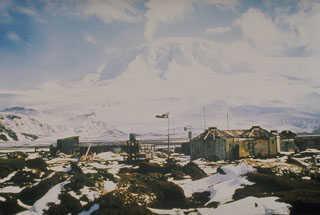Report on Heard (Australia) — January 2008
Bulletin of the Global Volcanism Network, vol. 33, no. 1 (January 2008)
Managing Editor: Richard Wunderman.
Heard (Australia) Rare thermal anomalies through March 2008 suggest eruptions
Please cite this report as:
Global Volcanism Program, 2008. Report on Heard (Australia) (Wunderman, R., ed.). Bulletin of the Global Volcanism Network, 33:1. Smithsonian Institution. https://doi.org/10.5479/si.GVP.BGVN200801-234010
Heard
Australia
53.106°S, 73.513°E; summit elev. 2745 m
All times are local (unless otherwise noted)
Due to its isolated location in the S Indian Ocean on the Kerguelen Plateau, Heard Island is rarely visited, and satellite imagery provides the only regular information on eruptive activity. The Hawai'i Institute of Geophysics and Planetology (HIGP) Thermal Alerts System MODVOLC provides an analysis of MODIS (Moderate Resolution Imaging Spectroradiometer) satellite thermal anomaly data, with 1-2 daily observations. That system remains the best source of evidence at isolated, glacier-covered volcanoes like Heard, though it is difficult to determine how often meteorological clouds may obscure thermal anomalies.
The last report summarized activity beginning in March 2000 (BGVN 32:06), describing three eruptive episodes (based on thermal anomalies). The last thermal anomaly mentioned was on 6 April 2007. As seen on table 5, the MODVOLC system recorded the next thermal anomaly on 24 July 2007. For the rest of 2007, there were anomalies recorded on two days in August and two days in November. During 2008 as late as 2 March, anomalies occurred in February and March.
Table 5. Thermal anomalies measured by MODIS/MODVOLC over Heard Island during 7 April 2007 through 2 March 2008. Courtesy of HIGP Thermal Anomalies Team.
| Date | Time (UTC) | Pixels | Satellite |
| 24 Jul 2007 | 1750 | 1 | Aqua |
| 12 Aug 2007 | 1820 | 1 | Terra |
| 30 Aug 2007 | 1955 | 1 | Aqua |
| 11 Nov 2007 | 1800 | 1 | Terra |
| 11 Nov 2007 | 1945 | 2 | Aqua |
| 22 Feb 2008 | 1955 | 3 | Aqua |
| 02 Mar 2008 | 1950 | 1 | Aqua |
Geological Summary. Heard Island on the Kerguelen Plateau in the southern Indian Ocean consists primarily of the emergent portion of two volcanic structures. The large glacier-covered composite basaltic-to-trachytic cone of Big Ben comprises most of the island, and the smaller Mt. Dixon lies at the NW tip of the island across a narrow isthmus. Little is known about the structure of Big Ben because of its extensive ice cover. The active Mawson Peak forms the island's high point and lies within a 5-6 km wide caldera breached to the SW side of Big Ben. Small satellitic scoria cones are mostly located on the northern coast. Several subglacial eruptions have been reported at this isolated volcano, but observations are infrequent and additional activity may have occurred.
Information Contacts: Hawai'i Institute of Geophysics and Planetology (HIGP) Thermal Alerts System, School of Ocean and Earth Science and Technology (SOEST), Univ. of Hawai'i, 2525 Correa Road, Honolulu, HI 96822, USA (URL: http://modis.higp.hawaii.edu/).

